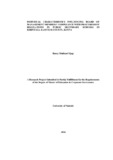| dc.description.abstract | The purpose of this study was to investigate factors influencing Board of
Management members‟ compliance with procurement regulations in public
secondary schools in Kirinyaga East sub-county, Kenya. The study was guided
by the following objectives :to establish the influence of Board of Management
members‟ level of sensitization on compliance to procurement regulations, to
determine the influence of Board of Management members‟ exposure to
training on compliance to procurement regulations, to establish the influence of
Board of Management members‟ personal ethics on compliance to
procurement regulations and to determine the influence of Board of
Management members‟ level of education on compliance to procurement
regulations in public secondary schools in Kirinyaga East sub-county. The
study employed descriptive survey design. By use of stratified sampling, the
researcher was able to obtain the desired sample size by grouping the schools
into four categories. Purposive sampling was used to select BoM members
who were part of the tendering and procurement committee. A total of 200
BoM members were thus enjoined in the study. Data was collected using
structured questionnaires, self administered to both the head teachers and the
BoM members. Data analysis was done by use of SPSS software (Version 20)
where data was coded, cleaned, sorted, analyzed descriptively and presented
using tables and charts. From the findings of the study, a higher percentage of
the BoM members (36.3) as well as a larger percentage of the principals (48.5)
believed in the various concepts of sensitization. The highly sensitized were
more compliant (52.90) compared to those lowly sensitized. On the influence
of trainings on compliance to procurement regulations, the findings of the
study showed that most of the BoM members as well as the principals had not
attended training workshops and seminars on compliance with procurement
regulations. However trainings influenced compliance to procurement
regulations where 56.5% of the trained complied against 43.5%. The findings
also revealed that among both the BoM members and principals, there were
considerable cases of unethical procurement cases being handled. It was also
noted that among all the cases of unethical practices in procurement, there
were many cases with regard to neutrality in picking the highest bidder and
equity in vetting for the same. The finding also revealed that competency in
procurement was influenced by education level where those with masters
degree were more compliant (51.7) compared to those with bachelors degree
(28.6). According to the responses posed with regard to respondents‟
recommendations on improving BoM members‟ compliance with procurement
regulations there was need to improve on, training, education levels and
exposure to procurement regulations. This will be able to enhance compliance
with procurement regulations in schools. | en_US |



